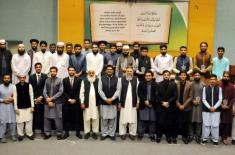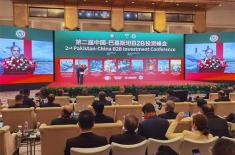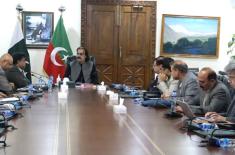
- Home
- World
- News
- Ni hao Meets As-salamu alaykum: How $8.5 Bln in B2B deals could forge a new economic destiny
Ni Hao Meets As-salamu Alaykum: How $8.5 Bln In B2B Deals Could Forge A New Economic Destiny
Fahad Shabbir (@FahadShabbir) Published September 05, 2025 | 11:11 PM

The Second Pakistan-China B2B Investment Conference kicked off at the China World Hotel in Beijing on September 4, with the atmosphere buzzing with activity
BEIJING, (APP - UrduPoint / Pakistan Point News - 5th Sep, 2025) The Second Pakistan-China B2B Investment Conference kicked off at the China World Hotel in Beijing on September 4, with the atmosphere buzzing with activity.
Pakistani and Chinese executives exchanged greetings, "Ni hao" and "As-salamu alaykum," as they explored joint business opportunities across different sectors, while discussions focused on how both sides could leverage each other's strengths for mutual growth.
Tablets displayed factory tours and textile samples, and attendees exchanged contacts, scanned QR codes, and captured photos, their faces lit by phone screens.
Amid this lively exchange, Prime Minister Shehbaz Sharif took the stage, calling the developments a "long march of economic growth."
Pakistan has a large workforce with significant potential, yet access to advanced machinery and technical training remains limited in some sectors. "Naming one technology won't capture the challenge. It's everywhere we need it. In textiles, we lack both the right machinery and trained staff. Locally, jackets sell for $2–$4, but with proper equipment and expertise, we could produce high-end versions worth $80. The problem is, the skill to operate these machines isn't here yet," Osama Abid, CEO of Al-Hammd International, a 69-year-old textile company, put it frankly.
Instead of just one big deal, the signed accords painted a picture of a diversified and dynamic partnership that spanned a wide range of sectors. The shared goal was simple, that is, to leverage China's technological and industrial might to unlock Pakistan's vast, and often untapped, potential, China Economic Net (CEN) reported on Friday.
Echoing this vision, Wang Zihai, Honorary Investment Counselor and Deputy Director General of the Pakistan (China) Economic Cooperation Centre (PECC), said that Chinese firms applying their domestic industrial experience in Pakistan could create a win-win solution—leveraging Pakistan's abundant raw materials and labor while meeting local demand, all through the sharing of technology and expertise. On the Pakistani side, the message was equally pragmatic.
Engr. Asad Ahmed, CEO of the state-owned Pakistan Mineral Development Corporation, highlighted the opportunities for collaboration with Chinese companies in Pakistan's mineral sector, particularly in iron, copper, critical minerals, and coal for steel production. "We see strong prospects for rapid development of Pakistan's mineral sector through Sino-Pak collaboration, potentially positioning the country as a major global producer, akin to Peru or Chile," he added.
Meanwhile, textile executives such as Kashif Mehtab Chawla of Al-Karam Textiles highlighted Pakistan's existing advantages, including zero-tariff access to the EU under the GSP+ scheme, which makes the country an attractive export hub. This opens opportunities for joint ventures and collaborations that benefit both Pakistani and Chinese companies.
The conference also showcased progress on the financial front. Masoom Raza, CEO of Askari Shoes, said his company has started conducting transactions in Chinese Yuan with Chinese partners, signaling a growing comfort with local Currency settlements and closer commercial ties. Also, joint ventures emerged as a key topic at the conference, highlighting active collaboration between Pakistani and Chinese companies. Imran Ahmad, CEO of Niagara Textiles, confirmed the immediacy of the deals, stating that he was "discussing a joint venture with a Chinese company and hoped to sign an agreement today."
Amidst the optimism, insights from the business floor offered a clear view of the path ahead. Several business leaders noted that the main challenge lies in navigating local regulatory and administrative processes rather than a lack of opportunity.
Khurrum Nadeem, Divisional Head of Investment Banking at Pak China Investment Company Limited, observed, "When Chinese companies come to Pakistan, they often find the business environment different from China. Regulatory approvals, the banking system, and import-export procedures all work differently here.
"
Xu Guimin of Zhongjing Kehui (Shandong) New Energy and Technology Co., LTD, a veteran of previous projects in Pakistan, reinforced this point and emphasized the importance of continued improvements to make business processes even more seamless for investors.
Some challenges also stem from communication and cultural differences. Masoom Raza noted that "the first barrier is language," highlighting the small but real hurdles that can arise when collaborating across borders. Logistics, too, remains a major hurdle. Shoaib Khan, CEO of e-commerce platform Markaz Technology, noted that while Pakistan has advanced in software development, last-mile delivery infrastructure still needs improvement.
"In China, an order from Taobao can arrive in 48–72 hours, but similar deliveries in Pakistan can take 5 to 7 days, sometimes longer," he said. Khan expressed interest in collaborating with Chinese partners to enhance delivery systems, including electric vehicle–based solutions, and to attract investment for expanding infrastructure for both domestic and cross-border orders.
Prime Minister Sharif seemed to hear these calls to action loud and clear. He made a personal pledge to investors, "We will not tolerate a second's delay." He recounted an anecdote of a Chinese entrepreneur being facilitated in just 24 hours, a story meant to underscore a new, expedited approach to doing business.
Ren Hongbin, Chairman of the China Council for the Promotion of International Trade (CCPIT), also made commitments to deepen bilateral cooperation. He highlighted that CCPIT, together with Pakistani partners, will strengthen multilateral and bilateral business cooperation mechanisms, deepen industrial and supply chain collaboration, and enhance trade and investment between enterprises.
Sharif also addressed a key concern head-on, stating that the security of Chinese citizens in Pakistan was "paramount," a crucial reassurance for companies considering long-term investments.
The conference went beyond the on-site signing of agreements, generating long-term ripple effects. As it drew to a close, a sense of shared purpose was palpable. Participants were taking part in a transformation of the bilateral business narrative. New financial arrangements, including the use of local currency for trade, reflect a deepening partnership.
To further facilitate investment across Pakistan, the government has established the Special Investment Facilitation Council (SIFC), aimed at expediting approvals for major projects and directly addressing investors' concerns, as explained by Saidal Khan Luni, Secretary of Mines & Minerals Development Department, Balochistan.
At the corporate level, efforts are underway to smooth the path for investors. Khurrum Nadeem told China Economic Net that for companies looking to do business in Pakistan, "We guide companies through the process and help them adjust. Approvals may take a bit longer initially, but once companies commit to investing and growing here, everything falls into place." So far, Chinese and Pakistani companies have signed agreements totaling $8.5 billion, including $7 billion in Memoranda of Understanding and $1.54 billion in Joint Ventures at the conference, spanning sectors from agriculture and electric vehicles to solar energy, health, chemicals, and steel.
The ambition is clear. "Pakistan is aiming to become a major manufacturing hub," said Abdul Rehman, General Manager of International Trade Services, Pakistan, who runs operations in both Pakistan and China, serving as a bridge between the two markets. His vision reflects confidence in Pakistan's skilled workforce and growing industries, as well as the potential benefits of collaboration with Chinese partners. Sharif's closing remarks captured the collective spirit of the conference, "We know the path is challenging, but not impossible. With determination and the right partnerships, progress can be made."
APP/asg
Recent Stories

NHA marks Eid Milad-un-Nabi (PBUH) with devotion & reverence

Seerat-un-Nabi (PBUH) great model to develop social justice, equality: Law Minis ..

Rescue 1122 continues relief operations in flood-hit Chenab river areas

Rana urges PTI to resolve political issues through dialogue

Khatm-e-Nabuwwat Conference highlights threats from Qadianis in Chiniot

SSC second annual exams rescheduled to start on Sep 29

Attock police vows stern action against food smuggling, DPO chairs key meeting

Ni hao Meets As-salamu alaykum: How $8.5 Bln in B2B deals could forge a new econ ..

Six injured in Mardan accident

38th KP Cabinet meeting held

Govt committed to agricultural relief: Minister of State Huzaifa Rehman

Rajuha Police crack down on drug peddler, seize heroin worth lakhs
More Stories From World
-

Ni hao Meets As-salamu alaykum: How $8.5 Bln in B2B deals could forge a new economic destiny
4 minutes ago -

Pakistan-China B2B Investment Conference in Beijing Yields $8.5 Billion in Agreements and MoUs
9 minutes ago -
UN warns wildfire smoke worsening global air pollution crisis
9 hours ago -
China to provide nearly $7M in aid to Kabul for Afghanistan earthquake
12 hours ago -
Nepal blocks social media platforms for failure to register
12 hours ago -
Afghanistan quake death toll rises to over 2,200 as rescuers battle to reach survivors : Reports
22 hours ago
-
PM Shehbaz Sharif address points out direction for further development of Pak-China economic, trade ..
1 day ago -
PM assures to remove all hiccups as Pak, China business firms sign $4.2 bln pacts
1 day ago -
PM Shehbaz Sharif's visit takes Pak-China relations to unprecedented heights: Atta Tarar
1 day ago -
Pakistan, China agree to continue working closely for upgraded CPEC-II
1 day ago -
PM Shehbaz to meet Chinese Premier Li, preside business conference today
2 days ago -
UN chief 'profoundly saddened' by deadly floods in Pakistan
2 days ago

